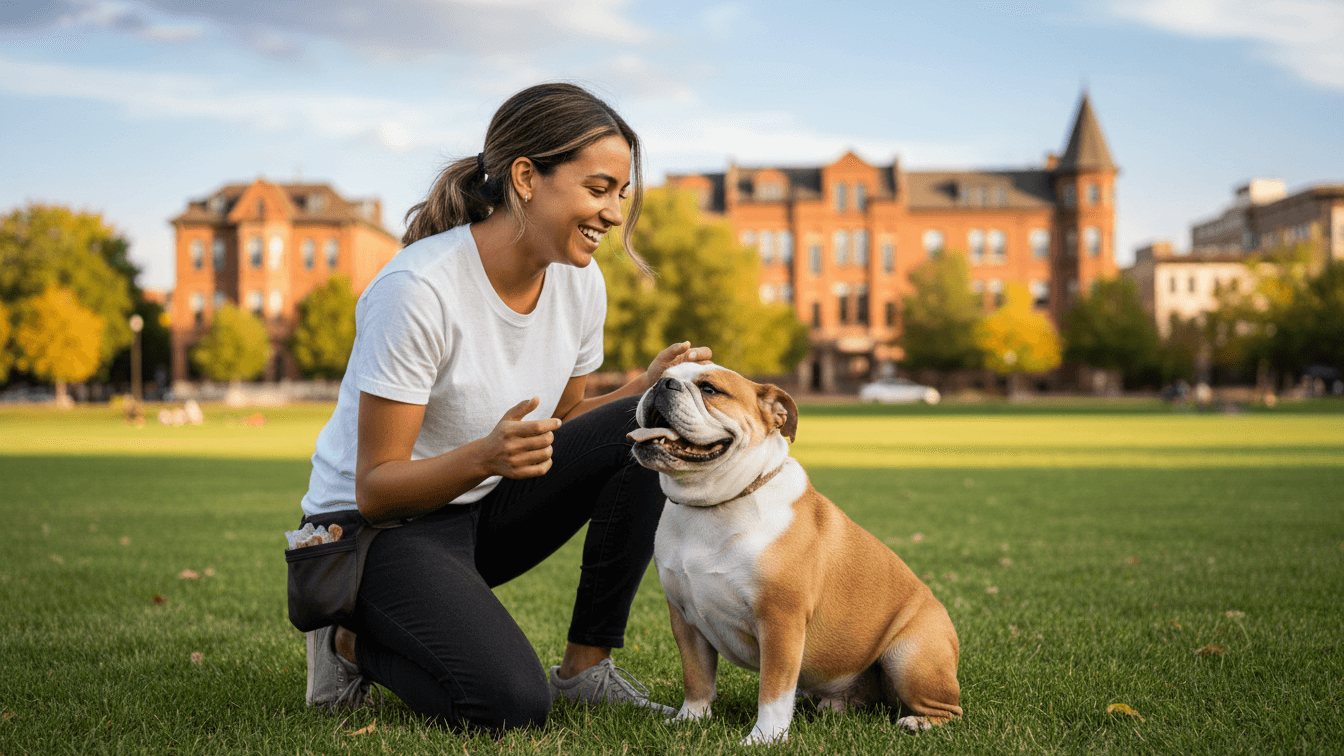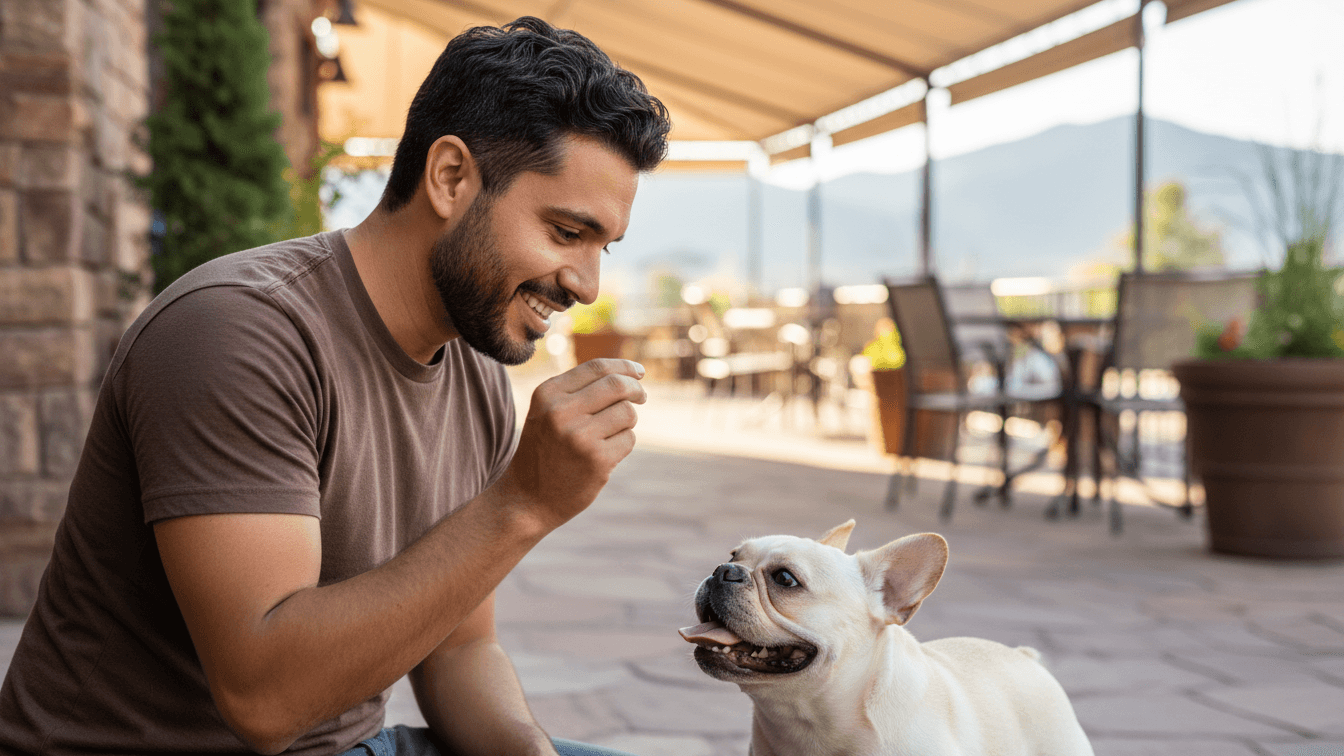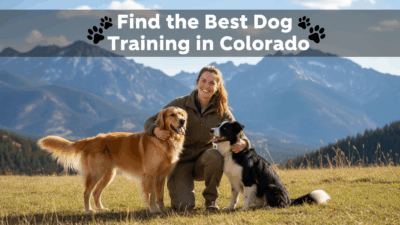Your Complete Guide to Choosing a Dog Trainer in Colorado
Colorado dog owners face unique challenges that make professional dog training worth considering. From managing your pup’s excitement on crowded Denver trails to teaching calm behavior at mountain-town outdoor patios, the right trainer can help your dog handle everything Colorado throws at them.
The state’s active lifestyle means your dog will encounter hikers, cyclists, wildlife, and other dogs almost daily. Training helps your dog stay focused and safe whether you’re navigating busy Fort Collins streets or enjoying quieter moments in Colorado Springs parks.
How to Choose the Right Trainer
Look for a professional dog trainer who understands Colorado’s outdoor culture and uses positive reinforcement training methods. Your dog needs to master loose-leash walking on busy trails, recall around squirrels and deer, and polite greetings at breweries and farmers markets.
Credentials give you a clear way to compare experience levels. Common dog trainer certifications include CPDT-KA, KPA-CTP, or IAABC-CDBC for serious behavior problems. If your dog shows aggression or extreme fear, seek someone with CBCC-KA credentials or a science-based program like CTC.
In-home dog training works best for problems that happen at your house like door manners, jumping on guests, or barking at delivery drivers. Group classes help your dog learn to focus around distractions, which prepares them for real Colorado life at dog-friendly patios and parks.
Private lessons let you customize everything around your specific goals, whether that’s preparing for backcountry adventures or simply walking calmly through your neighborhood. Day training can speed up results if your schedule makes consistent practice difficult.
Ask if your trainer has experience with altitude adjustment for dogs new to Colorado, trail etiquette, and wildlife desensitization. These details matter when you’re trying to build a well-behaved dog who can handle the state’s unique environment.
Common Dog Training Methods Explained

Reward-based methods create lasting behavior changes while building the trust you need for off-leash reliability on trails. These methods also help you follow local leash laws and keep your dog safe around wildlife.
Basic obedience covers sit, down, stay, recall, place, and leash training so your dog can handle everything from vet visits to outdoor concerts. Strong recall is especially important in Colorado where off-leash areas and wildlife encounters are common.
Puppy training focuses on socialization, potty training, bite inhibition, crate comfort, and early leash skills. Starting young prevents problems before they develop, and proper socialization helps puppies adjust to Colorado’s high elevation and active lifestyle.
Behavior modification addresses reactivity, fear, separation anxiety, or resource guarding through careful desensitization work. For serious cases, look for trainers who collaborate with veterinary behaviorists.
Dog obedience training builds the foundation skills you need before adding distractions like mountain bikers, other dogs, or wildlife. The best training programs teach your dog to think and make good choices rather than just follow commands robotically.
Specialized training like service dog training or therapy dog training requires extra structure and public-access skills. These programs need clear benchmarks and much longer timelines than basic manners training.
Puppy classes give young dogs safe exposure to new people, surfaces, and sounds during their critical socialization period. Good classes limit class size, screen participants carefully, and teach calm behavior instead of creating chaos.
Stay away from trainers who rely on fear, pain, or intimidation. These methods can create new behavior problems, damage your bond with your dog, and make reactivity worse over time.
Average Cost of Dog Training in Colorado (Updated for 2025)
Prices across Colorado vary based on location, trainer experience, and session length. Urban areas like Denver, Boulder, and Fort Collins tend to run higher than smaller mountain communities.
| Service Type | Average Cost (Colorado) |
|---|---|
| Puppy classes (4-6 weeks) | $175-$325 total |
| Group obedience classes (4-6 weeks) | $180-$350 total |
| Private lessons (60-90 min) | $125-$225 per session |
| In-home training packages (4-6 visits) | $500-$1,100 total |
| Day training (per week) | $500-$1,200 |
| Behavior consultation (initial) | $175-$300 |
| Board and train (2-4 weeks) | $2,500-$5,500 total |
Expect travel fees if you live in mountain areas or rural parts of the state. Behavior modification for aggression or severe anxiety typically costs more than basic obedience work.
Make sure you understand what’s included in each package, how progress gets measured, and whether the trainer offers a free consultation before you commit to a training program.
Questions to Ask a Potential Dog Trainer
- What training methods do you use, and how do you keep training sessions positive and effective?
- What credentials do you hold, such as CPDT-KSA or KPA-CTP, and how do you stay current with new techniques?
- How will you customize your approach for my dog’s temperament and our Colorado lifestyle goals?
- Do you have experience with wildlife desensitization and trail manners for Colorado dogs?
- What format works best for my goals: group classes, private lessons, or day training?
- How will we track my dog’s progress and know when to increase difficulty?
- What are the total costs including travel fees, and what’s your cancellation policy?
- Do you carry liability insurance for your training services?
- For behavior problems, will you work with my veterinarian or recommend a veterinary behaviorist if needed?
- What should I practice between sessions to help my dog improve faster?
Local Colorado Rules and Considerations
Colorado state law gives local governments authority over most dog regulations, so rules vary between cities and counties. Understanding these requirements helps you stay compliant and keeps your dog safe.
Most Colorado municipalities require leashes in public spaces except inside designated off-leash areas. Denver, Boulder, Fort Collins, and Colorado Springs all enforce leash laws on trails, sidewalks, and parks.
Colorado doesn’t require pet licensing at the state level, but most cities and counties do. Check with your local animal control office for specific requirements in your area.
Rabies vaccination is mandatory throughout Colorado under state law. Dogs must receive their first rabies vaccine by four months of age, and boosters depend on whether you use a one-year or three-year vaccine.
The Colorado Pet Animal Care Facilities Act regulates any business that boards, breeds, or sells animals. If your trainer offers board and train services, their facility should be licensed and inspected by the Colorado Department of Agriculture.
Nuisance barking and off-leash violations can result in fines in most Colorado cities. Work with your trainer on alert barking and separation anxiety before neighbors file complaints.
Wildlife encounters are common across Colorado, especially in foothill and mountain communities. Training your dog to ignore deer, elk, rabbits, and squirrels protects wildlife and prevents dangerous chase situations.
Many Colorado trail systems require leashes even on multi-use paths. Check specific regulations for state parks, national forests, and open space areas before assuming off-leash access is allowed.
Local Colorado Resources for Dog Owners
Colorado offers excellent spaces to practice training and provide enrichment for your dog. Always follow posted rules and practice good trail etiquette.
- Denver has numerous fenced dog parks including Railyard Dog Park near downtown and Berkeley Dog Park in Northwest Denver, both offering separate areas for small and large dogs
- Boulder’s Valmont Dog Park features large fenced areas with varied terrain, water features, and plenty of shade for summer training sessions
- Colorado Springs offers several options including Palmer Park Dog Park with beautiful views and separate small-dog areas
- Chatfield State Park and Cherry Creek State Park both have designated off-leash areas where you can practice recall around other dogs and people
- Many Colorado cities maintain lists of approved dog parks and off-leash areas on their animal services websites
Check with your city or county animal services for complete lists of legal off-leash areas and current regulations before visiting.

FAQs
How much does in-home dog training cost?
Most Colorado trainers charge $125-$225 per in-home visit depending on location and expertise. Mountain communities and rural areas often include travel fees. Packages of 4-6 sessions typically offer discounts over single-session pricing.
Is in-home dog training worth it?
Yes, especially for problems that happen at home like door reactivity, jumping on guests, or separation anxiety. Your trainer can address issues in the exact environment where they occur, then help you practice leash skills on your actual neighborhood streets and trails.
Can you pay someone to house train your dog?
Many trainers offer puppy training programs that include potty training, crate training, and schedule development. Day training can speed up the process since the trainer works with your dog during the day, then teaches you how to maintain the progress.
What is the 3-3-3 rule for dog training?
This guideline helps you understand adjustment periods for new or adopted dogs. Expect about 3 days for initial decompression, 3 weeks to learn your routines, and 3 months to feel fully settled. Good training programs work with this natural timeline rather than rushing progress.
How long will it take to reach my training goals?
Most puppies and friendly adult dogs show solid progress in 4-8 weeks with daily practice. Behavior modification for reactivity, fear, or aggression typically requires several months of gradual desensitization work. Colorado’s outdoor lifestyle gives you plenty of opportunities to practice, which can speed up results.
What should I bring to group classes?
Pack a flat collar or harness, 6-foot leash, high-value treats, water bowl, and current vaccination records. Leave retractable leashes at home for safety. Bring extra layers since many Colorado facilities can be cool, especially in mountain communities.
What’s the leash law in Colorado?
Colorado gives local governments authority over leash laws. Most cities and counties require leashes in public spaces except inside designated dog parks. Denver, Boulder, Fort Collins, and Colorado Springs all enforce leash requirements on trails, sidewalks, and parks.
Do I need a dog license in Colorado?
State law doesn’t require licensing, but most Colorado cities and counties do. Contact your local animal control office for specific requirements, fees, and renewal schedules in your area.
What shots does my dog need in Colorado?
Colorado law requires rabies vaccination for all dogs by four months of age. Your veterinarian will also likely recommend distemper-parvo combination vaccines and possibly bordetella, leptospirosis, and Lyme disease depending on your lifestyle and location.
Are dog trainers required to be licensed in Colorado?
Colorado doesn’t require special licenses for dog trainers. However, if a trainer offers board and train services, their facility must be licensed under the Pet Animal Care Facilities Act and inspected by the Colorado Department of Agriculture.
Where can I practice off-leash recall?
Use designated dog parks and off-leash areas to keep your practice legal and safe. Many Colorado cities offer fenced dog parks perfect for recall work. Visit during quieter times when you’re starting out to reduce distractions.
Which dog parks allow training around Colorado?
Most Colorado dog parks allow training as long as you’re not running a commercial group class. Popular options include Railyard Dog Park in Denver, Valmont Dog Park in Boulder, Palmer Park Dog Park in Colorado Springs, and Fossil Creek Dog Park in Fort Collins.
What trails allow dogs for training?
Most Colorado trails require leashes, but some open space areas and state parks offer designated off-leash zones. Cherry Creek State Park and Chatfield State Park both have off-leash areas. Check specific regulations for national forests, as some trails allow voice and sight control instead of physical leashes.
How do I help my dog adjust to Colorado’s elevation?
Altitude can affect dogs just like people, especially if you’re moving from sea level. Start with shorter walks and training sessions, watch for excessive panting or fatigue, and give your dog several weeks to fully adjust before attempting long hikes or intense exercise.
What should I know about wildlife and dog training in Colorado?
Wildlife encounters are common across the state. Work with your trainer on strong recall and leave-it commands before attempting off-leash time. Keep your dog leashed during dawn and dusk when deer and elk are most active, and never let your dog chase wildlife.
The right combination of expert dog trainers, consistent practice, and understanding Colorado’s unique environment will help your dog become a confident companion. Whether you’re navigating busy Denver neighborhoods or exploring mountain trails, investing in professional training sets you up for years of safe adventures together.
